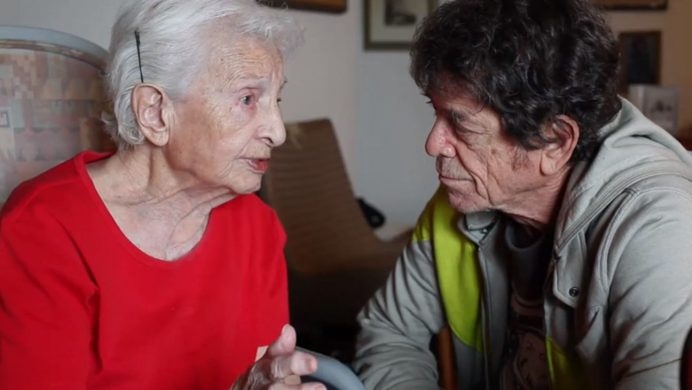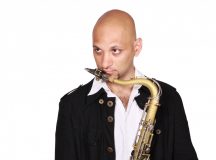When I was writing my book about the Jewish origins of punk, The Heebie-Jeebies at CBGB’s, I referred to Lou Reed as both the Alter Kocker (old fart) Indie Rocker and the Zayde (grandfather) of the movement. I still believe these titles fit the man, but in the wake of his recent death, I have come to see that he is deserving of a third. Like the figure in the Passover Seder that he played annually in public, Reed was the Wise Child. Unlike his brothers, the Wicked Child, the Simple Child, and the One Unable to Ask, he saw both the tragedy and triumph of Jewish history.
It wasn’t always that way.
Born in Brooklyn in 1942 – only two months after the Wannsee Conference – Lewis Allen Rabinowitz grew up amidst a backdrop of intense anti-Semitism. Henry Ford’s The International Jew was still in distribution and radio demagogue Father Coughlin still had ‘gas on the stomach and Hitler on the brain,’ to quote Woody Guthrie. Still, America had entered the war and things were beginning to look up. Within a year of his birth, Lou’s father had changed the family name and moved the newly ‘christened’ Reeds to suburban Freeport. The goal wasn’t just social mobility. It was to escape a Jewish history of feeling second-rate.
If only it were so easy. Coming of age amidst the manicured lawns and spotless garages, Reed sensed a foreboding darkness. His parents put him through electroshock therapy in part to shake it, but within a decade he was singing with The Velvet Underground about using drugs to blot out images of both ‘dead bodies piled up in mounds’ and ‘the sacrificial remains’ of a ‘ghost-bloodied country’ that was ‘hard to forget.’ And he was rejecting Delmore Schwartz, the Nazi-obsessed Jewish-American poet who’d once inspired him, going from being his ‘European son’ to a version of Norman Mailer’s White Negro, a heroin user scoring from ‘the man’ in Harlem.
This wasn’t typical generation gap rebellion. It was rebellion as denial, a rejection of history and its discontents. It was the same rejection that had driven a college-age Reed uptown not for heroin but to have his hair straightened, the burning lye used by African-Americans also working on his detested Jewfro. And it was the same rejection that sent him into suicidal depression after his band’s lead singer – the Teutonic chanteuse Nico – broke off their romance by stating publicly, ‘I cannot make love to Jews anymore.’ When he sang later that he’d thought of her as his mountaintop and his peak, as everything he’d had but couldn’t keep, was he also thinking of her as a German and himself a Jew? Considering the same album contains a paean to one of Hitler’s favorite Aryan attributes, ‘pale blue eyes,’ perhaps.
Still, Reed was too much of an artist to deny what he knew for long. And so, almost despite himself, he began to inch toward reconciliation with his past. After writing one of rock’s few love songs to Jesus (‘help me find my proper place’), he went solo in the 1970s and began bringing his demons out of the closet. Like his spiritual godchildren in the Bowery – creators of punk such as Jeffry Hyman (Joey Ramone), Tamas Erdelyi (Tommy Ramone), Richard Blum (Handsome Dick Manitoba), Richard Meyers (Richard Hell), Martin Reverby (Martin Rev), Boruch Alan Bermowitz (Alan Vega), Chris Stein, etc. etc. etc. – Reed began exploring the spectre of Germany. Yet where the punks did so through a comic appropriation of Nazi imagery, Reed went to the heart of the matter in his wrenching 1973 concept album, Berlin. Though not set during the Nazi period, it paints a dark picture of a city populated by addicts and loners, a spiritually barren place laid bare like an open wound.
But Germany wasn’t Reed’s only target. In subsequent albums, he focused both on his city and himself. If as a younger man, he had exhibited the self-loathing implicit in the White Negro concept, now he mocked it, as in 1978’s I Wanna Be Black, where he voices a series of outrageous desires (to have ‘a stable of foxy whores,’ ‘a big prick,’ etc.) only to end with the ultimate wish to ‘fuck up the Jews.’ Meanwhile, in 1982’s My House, he again writes of Delmore Schwartz, but this time his approach is loving, referring to Schwartz as a ‘wandering Jew’ and his own Leopold Bloom (the Jewish protagonist of James Joyce’s Ulysses). Perhaps most significantly, in 1989’s Good Evening, Mr. Waldheim, Reed attacks not just the U.N. Secretary General who had recently been revealed to have a Nazi past, he also blasts presidential candidate Jesse Jackson for not only embracing Palestine Liberation Organisation (PLO) leader Yasser Arafat, but also letting slip that he thought of New York as ‘Hymietown’. Reed’s anger at Jackson is particularly heated because it stems from the hurt of betrayal. As he sings:
Jesse you say common ground / Does that include the PLO? / What about people right here, right now / Who fought for you not so long ago?
By the 1990s Reed was doing more than just singing, he was appearing annually at the Museum of Jewish Heritage’s Downtown Seder and making trips to Israel, performing there despite a widespread boycott by his musical peers. During one of these trips he befriended Rabbi Levi Weiman-Kelman, the spiritual leader of Jerusalem’s Progressive Judaism congregation Kol Haneshama; a man who now insists Reed had ‘a Jewish soul.’
Yet it was perhaps only three years before his death that Reed made the ultimate connection – and peace – with his past, producing and co-directing the film Red Shirley. In it, Reed interviews his elderly cousin, giggling appreciatively at her stories about her involvement in organised labour and the civil rights movement. When Shirley speaks about the destruction of her shtetl by the Nazis, however, saying that she is dedicating the film to its memory, Reed can only applaud, the ghost-bloodied country and its sacrificial remains now no longer something he’s attempting to forget, but instead keep alive through memory.
Wise Child that he was, Reed knew the Wicked Child was his nearest brother, the one who understood what he was rejecting. Neither Simple nor Unable to Ask, the Wicked Child had a choice, and as Reed matured, he made the right choice, embracing his past, both in its horror and its triumph. After all, dead bodies piled in mounds also included those martyred in the battle for civil rights. They were part of the common ground, part of Reed’s common ground, part of his history. That this common ground also included Reed’s Jewishness is self-evident. At least, it would be to the Wise Child, the one who is unafraid to look back.






































